Blogs
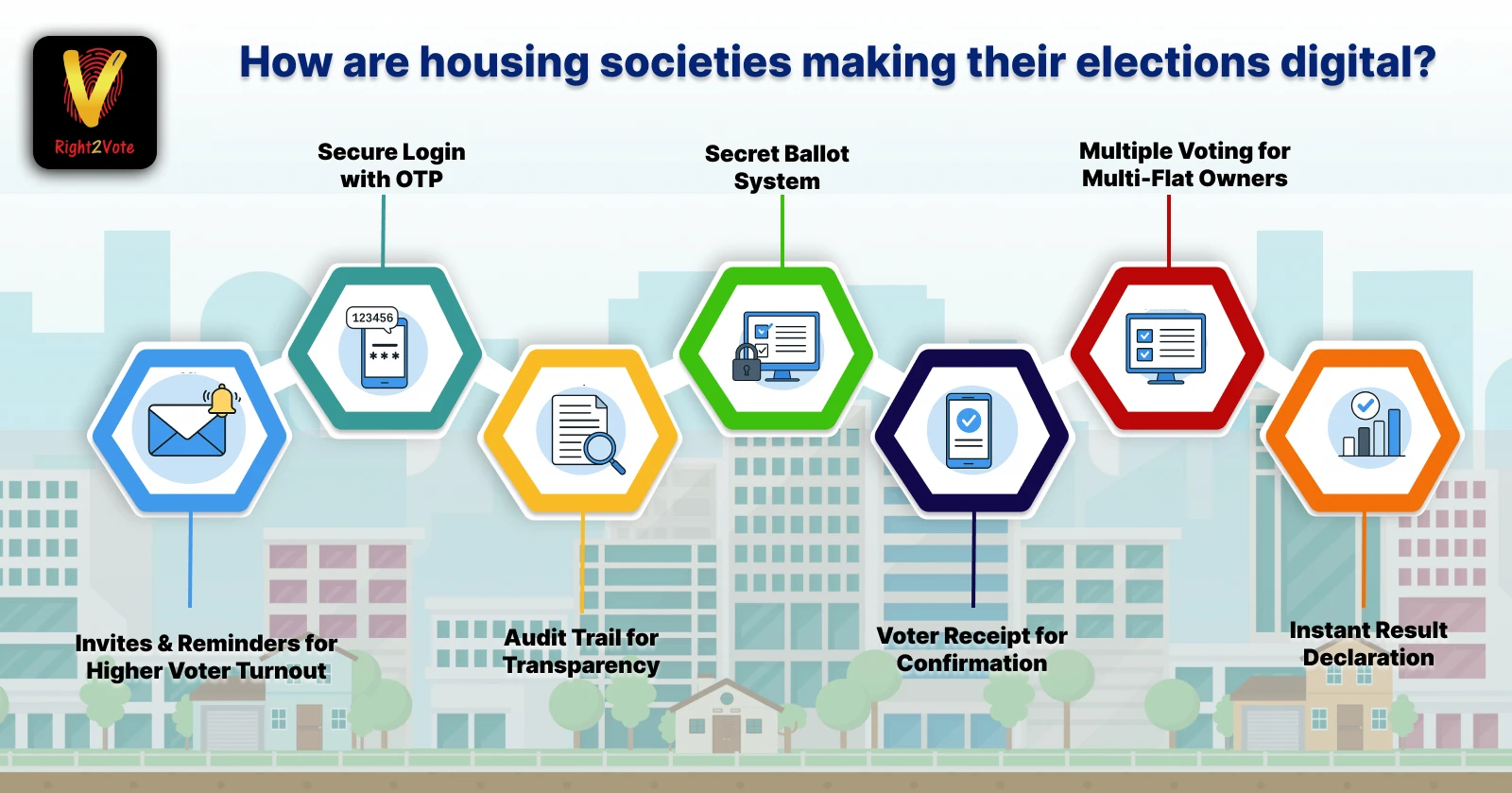
How Housing Societies Made Their Election Digital
The Sisirkunja Association of Apartment Owners, Kolkata had always followed the traditional method of holding offline elections - ballot boxes, paper ballots and voting booths. But in 2025, for the first time ever, they made a bold move: they decided to conduct their entire election online.
Read more..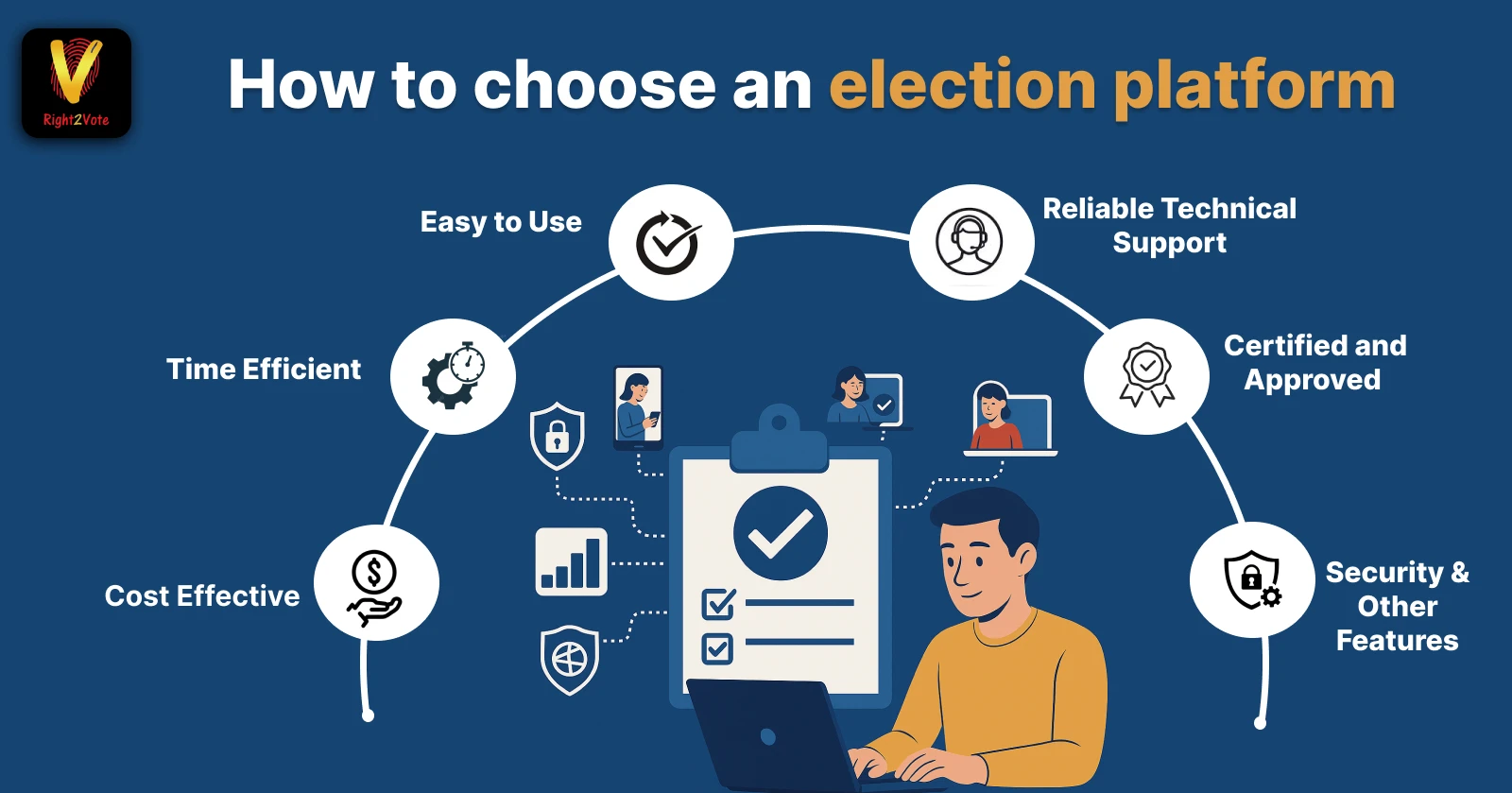
How to Choose an Election Platform
As the world moves further towards digital solutions, online elections have emerged as a secure, efficient and accessible alternative to traditional voting methods. However, selecting the right online election platform is crucial to ensure the integrity and success of the electoral process. This blog outlines key factors to consider when choosing an online election platform, with insights into how Right2Vote addresses these considerations.
Read more..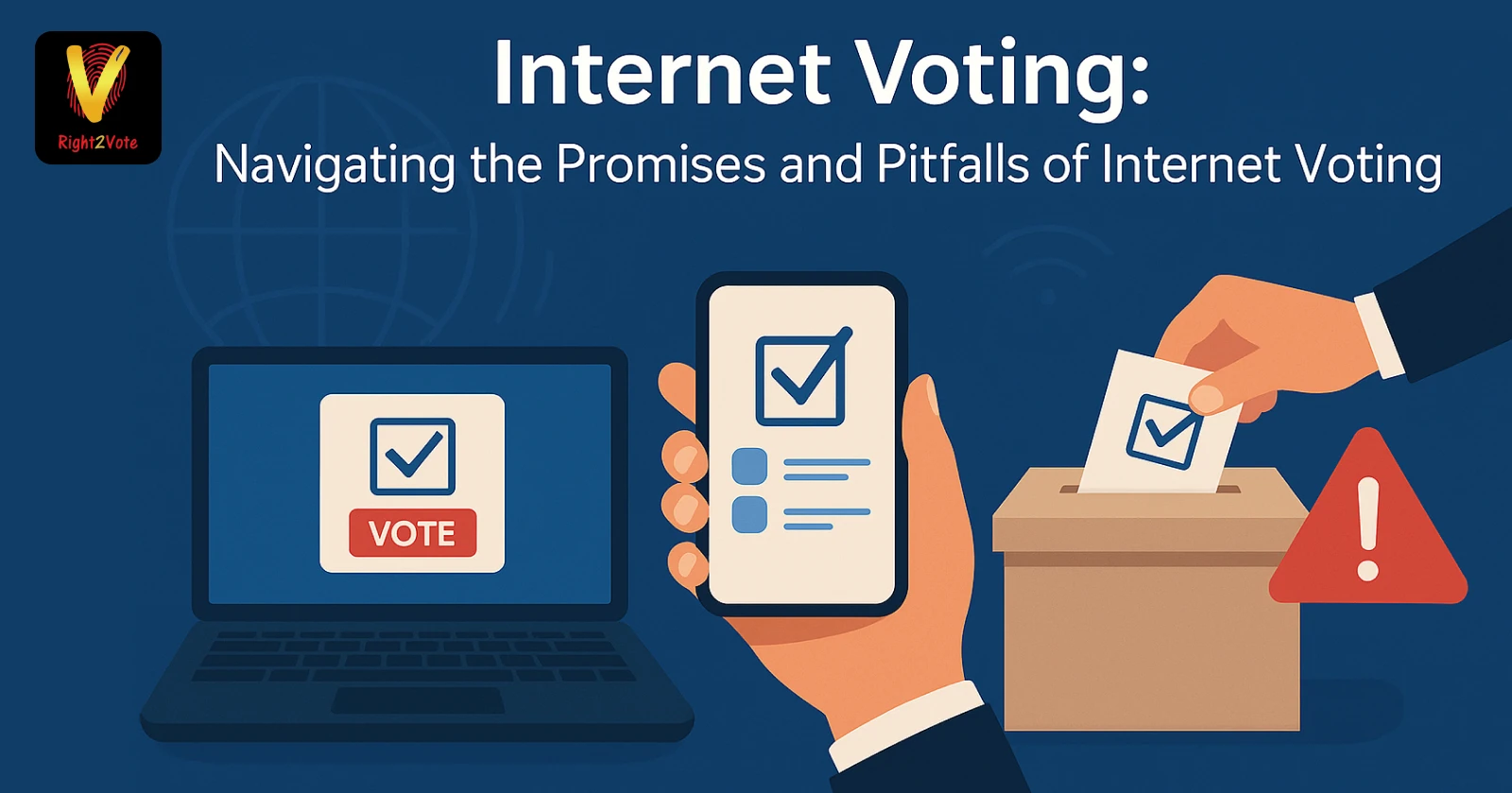
Internet Voting: Navigating the Promise and Pitfalls of Internet Voting
As life continues its digital shift, where everything from banking to communication has undergone a technological transformation, the question of modernizing our electoral processes naturally arises. Internet voting or eVoting, stands as a compelling frontier, promising a blend of convenience, efficiency and potentially higher voter engagement.
Read more..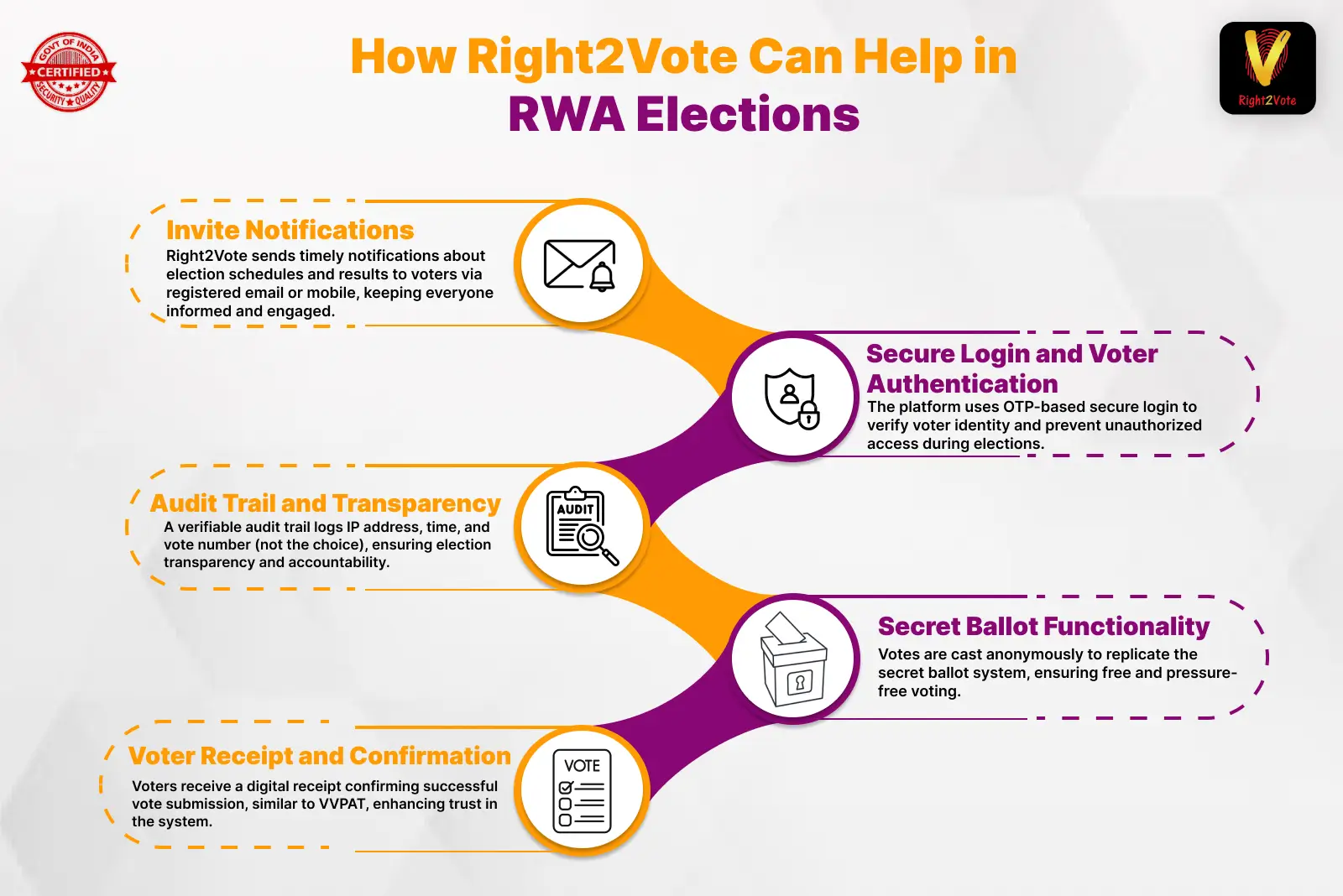
RWA Elections
RWA elections are a cornerstone of community governance, empowering residents to shape the management and development of their living environment. By adhering to established rules and embracing technological advancements like Right2vote’s online election platform, RWAs can ensure that elections are fair, transparent and inclusive.
Read more..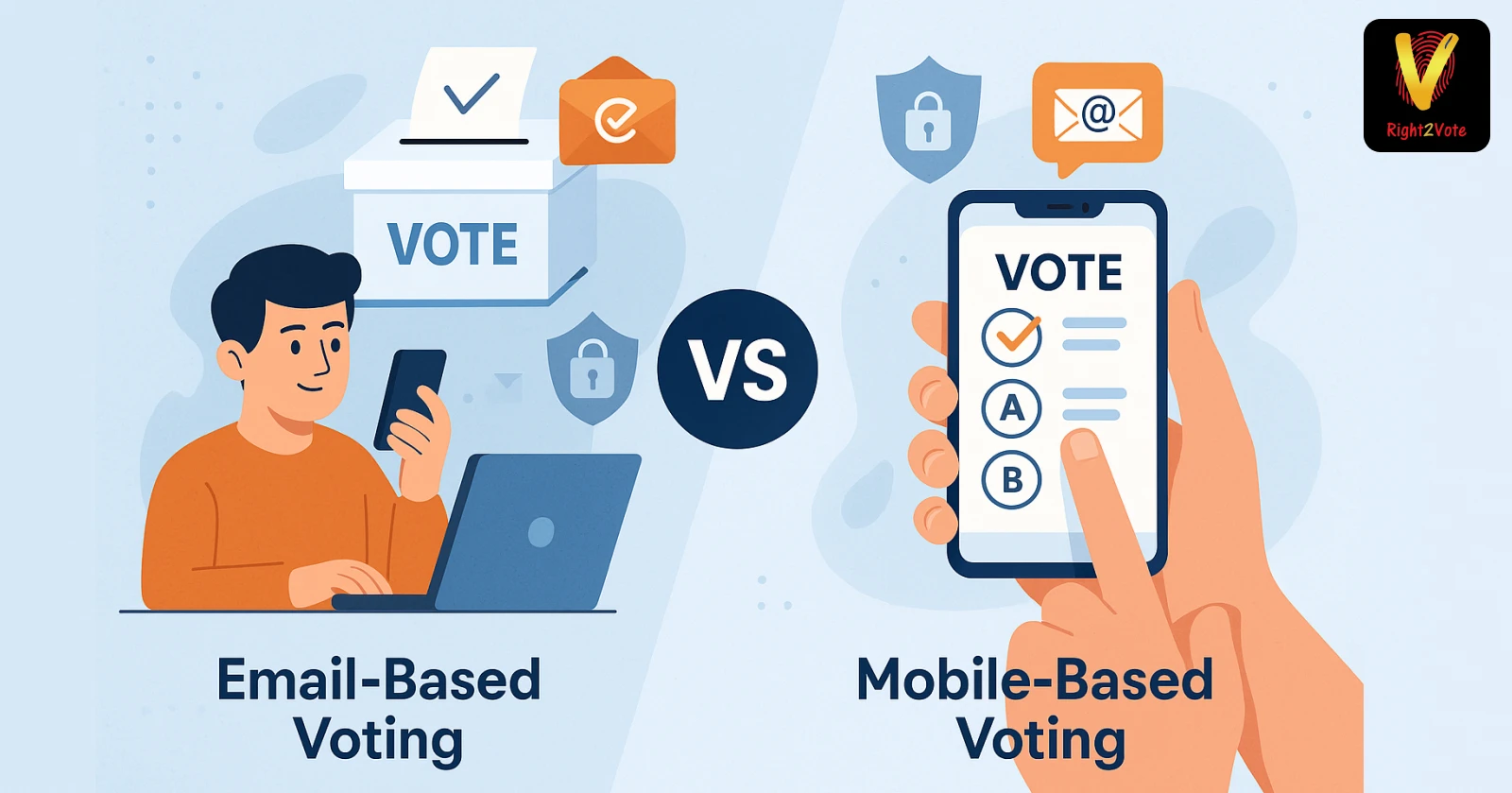
Email-Based Voting vs Mobile-Based Voting
Both email-based and mobile-based voting offer easy and modern ways to participate in elections without being physically present. While mobile voting through SMS or calls is simple and works well for basic elections like surveys or public opinion polls, email-based voting stands out for its better clarity and flexibility. It’s easier to share full instructions, and voters feel more secure using their email than their phone number.
Read more..
Election Result
When we talk about elections, whether it's a general (Lok Sabha) election, a state (Vidhan Sabha) election or other local elections like panchayat and municipal elections, transparency remains one of the most crucial aspects. Beyond the participation of candidates, election duties assigned to election management teams, ensuring integrity throughout the entire process from the election start date to the result declaration date, is vital.
Read more..
IBC Rules: A Comprehensive Guide
The Insolvency and Bankruptcy Code (IBC) was introduced to establish a structured, efficient and time-bound mechanism for handling insolvency and bankruptcy cases in India. The IBC Rules streamline debt resolution, safeguard creditor interests and foster a business-friendly environment.
Read more..
Election Technology
Elections have been a cornerstone of democracy for ages, and with the rapid technological changes, the way elections are conducted has transformed significantly. From paper ballots to electronic voting machines (EVMs) to online voting solutions, election technology is continuously evolving with time to increase accessibility, transparency and efficiency. Whether in democratic countries or non-democratic countries, election technology plays a crucial role in shaping the future of governance.
Read more..
Absentee Voting
Absentee voting is a process that allows voters to cast their votes even if they are unable to physically reach their allotted polling booth on election day. Absentee voting ensures that every individual who is away from their polling booth (registered location in voter ID) due to work, travel, health issues or any reason can still exercise their democratic right to vote. Right2Vote has the capability to enable absentee voting in India, addressing the limitations of the current system. By leveraging online voting technology, India can ensure that every eligible citizen has a fair opportunity to vote, regardless of their location.
Read more..
Delhi State Election 2025: The Evolution of AAP, Political Rivalries and the Role of Online Voting
As Delhi heads toward its 2025 state elections, the political landscape is filled with unpredictability. The Aam Aadmi Party (AAP) has been at the heart of Delhi’s political scene for over a decade, but the upcoming elections promise to be a pivotal moment, shaped by a series of complex events, changing dynamics and the potential game-changer of online voting. AAP's path, the intense competition with the Bharatiya Janata Party (BJP), the Congress's slow collapse and the potential of online voting to transform elections and produce unexpected changes.
Read more..
Jharkhand Assembly Election 2024: INDIA Bloc vs. NDA and What’s at Stake
The Jharkhand assembly election is drawing near, and the political arena is heating up. This year’s election is shaping up as a head-to-head battle between two major alliances: the INDIA bloc, led by the Jharkhand Mukti Morcha (JMM), and the National Democratic Alliance (NDA), led by the Bharatiya Janata Party (BJP). These alliances are currently busy with seat-sharing discussions, a tricky aspect of coalition politics where each party negotiates the constituencies they will contest. While online voting could significantly increase voter turnout, especially in remote areas, this option is still not provided by the government for voters’ convenience.
Read more..
Maharashtra State Elections 2024 - Total Instability Which STV And Online Voting Can Remedy
With the Maharashtra elections scheduled for 20 November 2024 and results to be declared on 23 November, the political landscape in the state has been shaped by dramatic shifts since the last election in 2019. After a series of alliances, betrayals, and unexpected power shifts, voters are left wondering if they can truly trust their political parties. What was once a state known for stable political alliances has since become a battleground for changing loyalties, leading to a sense of disenchantment among the electorate.Once again online voting is not allowed in Maharashtra election 2024.
Read more..
Jammu & Kashmir and Haryana Elections 2024 - Landmark Election Results
The political climate in Haryana and Jammu & Kashmir is poised for major shifts in 2024. In Jammu & Kashmir, as this election is the first since the historic abrogation of Article 370 in 2019, this represents a significant turning point for the region in Jammu & Kashmir. Meanwhile, Haryana turned into a battlefield in a hotly waged conflict. Important topics that influenced the political conversation included anti-incumbency, farmers' MSP and wrestlers' protests. Still unexpectedly, BJP was able to win the election for the third time in a row.
Read more..
E-Auction for Insolvency Cases: Revolutionizing the Resolution Process
Insolvency cases have traditionally been sunk in lengthy legal procedures, resulting in prolonged resolutions and often less-than-ideal outcomes for creditors and stakeholders. However, digital innovations like e-auctions are transforming this landscape by offering a more efficient, transparent, and fair mechanism for managing insolvency cases. This blog explores the idea of electronic auctions, their advantages for bankruptcy proceedings, and the contribution of government-approved platforms such as Right2Vote to improving these procedures.
Read more..
Hybrid Voting: The Solution to Increase Voter Participation in Elections
In national elections, voter turnout hovers around 65%, meaning nearly 35% of eligible voters do not cast their votes. This is quite normal because political parties often secure power with just about 35% of the total votes cast, leaving a large portion of the population unrepresented. A major reason for this gap is the limitations of the current voting system, which primarily uses Electronic Voting Machines (EVMs), is the geographical barrier. While EVMs are a significant improvement over paper ballots in terms of efficiency and accuracy, they still leave many voters unable to participate. A large number of voters are denied their right to vote, who could potentially influence the election's outcome if they had the opportunity to vote.
Read more..
Why Are People Afraid of Technology?
In the modern era, technology evolves rapidly. New advancements often come with high costs, making them initially less accessible. However, when innovation is focused on enhancing existing technologies, it directly benefits people by driving competition among companies to provide better services. As technology improves and becomes more accessible, the overall cost decreases, making it more valuable to a broader audience. If a technology is too expensive and out of reach for most people, its value diminishes. This dynamic creates a paradox: despite the clear benefits of technological progress, many people still harbor fear and apprehension towards it. So, why are people afraid of technology?
Read more..
Streamline Your Election with Online Voting Technology
The electoral landscape is changing dramatically in the current digital era. The development of online voting technology has revolutionized election administration by providing a more efficient method for holding elections in a variety of settings. This creative technology is transforming the way individuals engage in democratic functions, from association elections to student body votes and even political events. For organizations seeking to improve their electoral systems, new opportunities have arisen with the introduction of secure voting platforms and websites.
Read more..
Online Election: The Future of Voting
In an era where technology permeates every aspect of our lives, it's no surprise that the concept of online elections has gained significant traction. As traditional methods like Electronic Voting Machines (EVMs) become outdated, the shift towards digital solutions promises a more accessible, cost-effective, and secure way of conducting elections. This comprehensive guide delves into the intricacies of online elections, examining their benefits, challenges, and the future potential of this transformative approach to voting.
Read more..
Embracing Technology in Cooperative Society Elections: A Closer Look at Section 73CB(11)
The Maharashtra Co-operative Societies Act, 1960 enacted to regulate and facilitate the functioning of cooperative societies across Maharashtra, the Act provides a legal framework for governance, operations, and dispute resolution within these societies. This framework is especially pertinent in the context of housing societies, where it defines the rights and responsibilities of members, committees, and the management.
Read more..
Right To Vote : The Pillar of Democracy
In any democratic nation, the right to vote is not just a privilege but a fundamental cornerstone of the governance system. In India, the Right to Vote holds profound significance, reflecting the essence of democracy enshrined in its constitution.
Read more..
eVote for Free: Empowering Democracy Without Cost to Voters
In today's digital world, technology is reshaping the way we live, work and interact. It's no surprise that voting is also evolving, becoming more accessible and convenient through electronic voting or eVoting. One of the cornerstone principles of eVoting is that voters should not have to pay to cast their votes.
Read more..
Online Voting in Professional Associations
In an era dominated by digital transformation, professional associations are increasingly turning to online voting as a means to enhance member engagement, streamline processes, and increase accessibility.
Read more..
Online Voting Website for Lawyers
In the digital age, technological advancements continue to reshape various industries, including the legal profession. One such innovation is the implementation of online voting technology tailored specifically for lawyers.
Read more..
Online Voting in Trade Associations
In the rapidly advancing digital age, traditional trade associations are embracing innovative solutions to enhance member engagement and streamline decision-making processes. One such transformative tool is online voting.
Read more..
Why denying online voting option is equivalent to denying right to vote?
More than 33% of the Indian population or roughly 33 crore voters would not be able to vote in Indian Lok Sabha Election 2024 due to lack of online voting option. The winning party in the Indian Lok Sabha Election 2024 will win less than 33 crore votes in aggregate across all the Lok Sabha constituency.
Read more..
If online voting is allowed in Lok Sabha election 2024, what are the benefits?
In the Indian Lok Sabha Election 2024, online voting is not allowed. Make sure you travel to the specific booth during the specified 12-hour slot and vote. If you are travelling or located away from the booth, hard luck. You can transfer your money online, but not your vote.
Read more..
Online voting is not allowed in Lok Sabha Election 2024 – WHY?
In 2015, we started Right2Vote with the mission to upgrade elections in India to internet based online voting, where citizens can vote directly from their mobile from anywhere. No need to travel to booth and no need to stand in queue.
Read more..
eVoting Website For Employee Union Elections
In the fast-changing world of technology, the traditional methods of conducting union elections are being redefined. One significant advancement is the introduction of eVoting websites, providing a streamlined and efficient way to facilitate employee union elections.
Read more..
Election website for elections in Religious organizations
Religious organizations or associations primarily work to bring individuals together whose beliefs towards religions, rituals, and values are common. Unlike other associations that are formed with different purposes, like social or recreational interests, religious organizations mainly focused on matters of faith.
Read more..
Revolutionizing Medical Association Elections: The Power of eVoting
Medical associations play a vital role in upholding the standards of healthcare, advocating for their members, and shaping the future of the medical field. However, conducting fair and efficient elections within these associations often presents unique challenges.
Read more..
One Nation One Election - How eVoting can play an important role in this?
With over one billion people, India is the world's largest democracy and has a rich history of electoral processes. Over the years, India's electoral process has evolved from the era of paper ballots to the introduction of Electronic Voting Machines (EVMs).
Read more..
Secured And Transparent Online Voting
It is a myth created by vested interests that eVoting is not secure. In comparative terms, offline voting is much more unsecure, and it is not even comparable to online voting when it comes to security and transparency.
Read more..
Audit Trail in Online Voting
Transparency and Security are the two side of the same coin called Elections. Any election should be secured to ensure there is no chances of any hacking or manipulation.
Read more..
How secret is the Secret Ballot voting
Secret Ballot is one of the most important features of an election. Secret ballot is a constitutional protection provided to the voter to ensure he can vote with free will.
Read more..
Right2Vote won the Asia Pacific final of Tech4Democracy Global Entrepreneurship Challenge
Right2Vote won the coveted title of the best startup in Asia Pacific region at the Tech4Democracy venture day. Right2Vote is India based online election management company.
Read more..
Rules and procedures for housing society elections in India
Housing society elections in India is an important part of housing society life. The election in the society is supposed to follow certain rules and procedures. In this blog we intend to explain these rules and procedures.
Read more..
Is e-Voting Legal in Housing Cooperative Societies in India?
The short answer is – Yes, eVoting is legal in housing societies all across India. It is legal in all the states in India without exception.
Read more..
Gujarat Elections 2022 Results: 3-sided contest giving unfair advantage to BJP
Voting in Gujarat State Vidhan Sabha (Legislative Assembly) Elections is scheduled on 1st December 2022 and 5th December 2022 and result would be announced on 8th December 2022. We are not in the business of predicting election results, but it appears BJP has a clear advantage and may get more than 125 seats out of the 182 seats. In 2017 assembly election BJP vote share was 49.1% and it managed to win 99 seats.
Read more..
How to vote online in Gujarat Assembly elections?
The short answer is – Online voting is not allowed by government in Gujarat Assembly Elections. You will have to visit the booth, stand in a queue and vote. If you are outstation, then sorry, you are being denied your right to vote. The next question is why online voting is not allowed in Gujarat Assembly Elections? This is a very important and pertinent question.
Read more..
4 Benefits of Online Annual General Meeting (AGM)
In the wake of the global pandemic, most significant meetings and events are taking place online. In order to transition from an in-person conference to a virtual one, better planning and execution are required. The lack of interest and disconnection that occur in online meetings are different from those that occur in person. There is often a disconnection between the audience and the presenter when a meeting does not have an appropriate virtual medium or is poorly planned.
Read more..
How Online Voting Can Help State Elections in India? - Right2Vote
As the state assembly elections of UP, Punjab, and Uttarakhand are approaching, the governments are taking all sorts of precautions before the election rallies hit the roads. In January, the Uttarakhand High Court asked the Election Commission (EC) to seek various other moods of voting campaigning amidst the rising COVID pandemic cases. Online rallies and online voting were two of the most important solutions – High Court came up with. As on-road rallies can gather a large number of people, the online -mode of voting was considered.
Read more..
Benefits of eVoting Over Paper Ballots
Elections are an essential part of a democratic country. In the last century, India as a nation has relied heavily on Paper Ballots. But since the 2000s, India started using electronic machines (EVMs) in their elections. But now as the world is changing drastically, India is slowly moving towards Online Voting technology. eVoting is a newly adopted concept that has been changing the face of politics around the world remarkably.
Read more..
How Online Voting Can Revolutionize Trade Union Election
Trade unions or employee associations are associations of employees of a particular trade. These are organizations with a democratically elected management committee that represents all employees in negotiations with employers and help employees as well as employers to maintain a balanced relationship between them. The unions have gained ground due to the rapid industrial development. The workers around the world have come together to create employee associations in their respective organizations that would give them a proper ground to fight for better wages and working conditions.
Read more..
What is insolvency and bankruptcy code of India 2016?
Insolvency and bankruptcy code is nothing but a mechanism of settling failed or bankrupt entities without causing damage to any players of the economy. The code was passed by the parliament as a welcome gesture that overhauls the existing framework dealing with insolvency of corporations, individuals and partnerships. It paves way for the much-needed reforms while focusing on creditor driven insolvency resolution.
Read more..
Current offline voting systems are neither safe nor secure
For the last 2 years I have been trying to convince people that we need to move to mobile based voting system as it has several benefits including:
Read more..
How much India spends on a Lok Sabha election?
Foundation of good decision making is availability of sound data. I believe, big reason for low quality political decision making in India is misleading & low-quality data. The whole process of accounting in government is managed by people who have no training in accounting. Also, the leaders – bureaucrats from administrative services and politicians have no understanding of accounting.
Read more..
Aadhaar, Bio-metrics & Privacy
Let me start with a question. What is the information that you are sharing with Government of India under Aadhaar which anyway you were not sharing? Biometrics – Fingerprint & Iris scans? Even when I applied for my passport, providing fingerprint and Iris scan was a must. In countries like Malaysia and Dubai they took my fingerprint and iris scan at immigration and without that they would not let me enter their country. This shows that it was never a private data and nowhere in the world people have objected to sharing this kind of information.
Read more..
YES, we provide blockchain for eVoting. But do you really need it?
With cryptocurrencies hitting the roof, blockchain is the new fad. These days, I hear this question very often – are you using blockchain? Many of the people who ask us this question generally does not even know the difference between blockchain and bitcoin. Mostly we have heard this question from investors, startup ecosystem people and not from customers yet. But that day is not far off when customers would start asking this question. Hence here is the answer, YES – we do offer blockchain as an option. But our counter question is – Do you really need it? We believe very few clients would really need it and its important on our part to inform them about the pros and cons. This article aims to do just that.
Read more..
Don't blame the voter for low voter turnout
For the last three years, I have been meeting lot of politicians, political parties, election officers, government representatives, activists, NGOs and one common thing that I have noticed everywhere is that they blame the voter for the low voter turnout. And when I ask them how many times they themselves have voted – they always come up with a ‘genuine’ excuse why they have not voted most of the time!!
Read more..
Hacking & Mobile Voting
One of the common concern people have against Mobile Voting is hacking. Most of the people do not even understand the meaning of the word, but love to use it as an argument against hacking.
Read more..
Mobile Voting Vs EVM & Paper Ballot
Today there is huge debate going on in India regarding (Electronic Voting Machines) EVM used in voting. Many politicians lead by Mayawati, Arvind Kejriwal, Akhilesh Yadav, Rahul Gandhi have questioned the EVM and blamed them for the recent poll debacle. And considering they have questioned EVM, they are asking Election Commission (EC) to revert to Paper Ballot. Nobody is stating how paper ballot is better than EVM.
Read more..
Why Coercion is the only and not valid argument against Mobile Voting
This is the only argument people use against Mobile Voting – Coercion (the action or practice of persuading someone to do something by using force or threats.) Let me answer this and would love to discuss it for your views: 1. India is providing postal ballot facility to certain sections – election workers, soldiers. It would soon be extended to Non Residents and migrants. Why coercion is not an issue there? And in that case why not start with Mobile voting with these sections?
Read more..
Right2Vote – Our attempt to change the world
In the last 15 years we have regularly seen India being compared with China. We all are ashamed that our growth rate has been nothing compared to China. Every-time we try to find a reason for the same the conclusion is – India is a democracy, unlike China.
Read more..